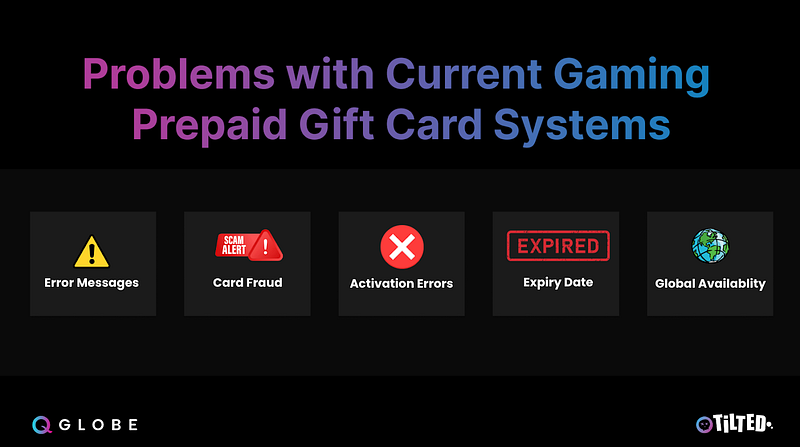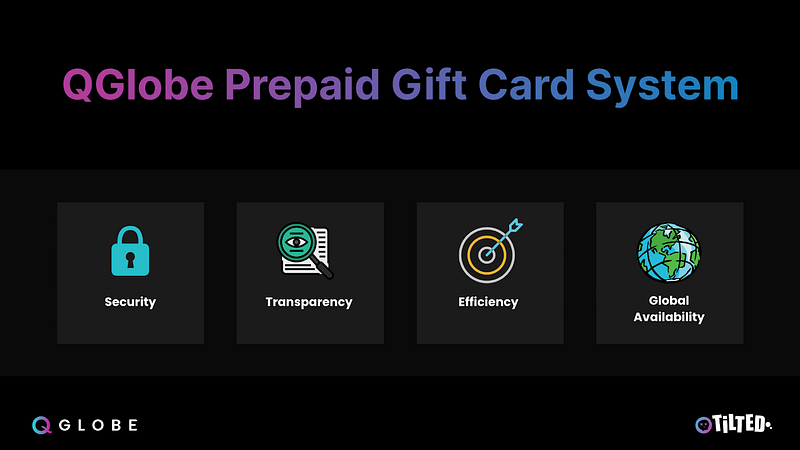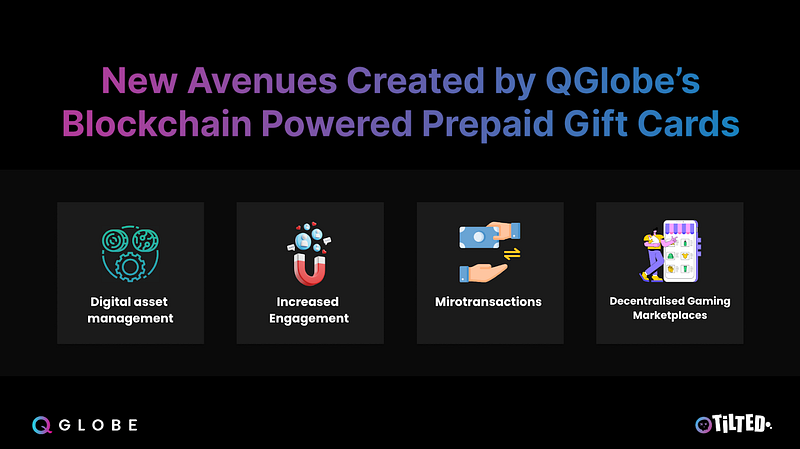The use of prepaid gift cards is becoming more prevalent in the gaming industry as more gamers turn to them as a convenient way of purchasing games and in-game items. However, there are several problems and limitations with the current gaming prepaid gift card systems that need to be addressed. These issues can make the user journey complicated and ruin the gaming experience. In this blog, we will explore these problems, how blockchain technology can fix them, and the new avenues that integrating blockchain into gaming prepaid gift cards creates.

- Error Messages
One of the common problems with current gaming prepaid gift card systems is the frequent occurrence of error messages. These messages can ruin the gaming experience and cause frustration for gamers. One common error message is an invalid code message, which appears when a gamer makes a mistake when entering a large digit card number and PIN. This problem is usually caused by mistaking alphabets for numbers, and it can be quite frustrating for gamers.
2. Card Fraud
Another common problem with gaming prepaid gift card systems is card fraud. Hackers can easily get access to unopened codes and use them to make purchases, leaving gamers with a worthless card. In some instances, a gamer may receive an error message when entering the card number and PIN because another person has already used it. This problem can occur when a gamer buys a card from an untrusted retailer or when someone has compromised the card.
3. Activation or Network Errors
Sometimes, gamers may receive an error message associated with activation or network when trying to redeem their prepaid gift card. For instance, when a gamer gets an “unable to load” error message, it may be because they have not activated their physical gift card purchase, or there is a network glitch when trying to redeem the card.
4. Expiry Dates
Receiving an expired error message is a common occurrence with gaming prepaid gift cards. Although the card does not expire, the provider may request the turnover of the unused gift card balance to the company by law. This policy can be frustrating for gamers who may not have used their card within the required period.
5. Global Availability
One significant limitation of current gaming prepaid gift card systems is their lack of global availability. Gift cards can only be redeemed in the country of the currency of the card. For instance, a $50 gift card can only be redeemed in the United States, and a £50 gift card can only be redeemed in the United Kingdom. This limitation can cause a “not available in your region” error message if the currency of the card does not support the gamer’s country of residence.
QGlobe is addressing many of the limitations and challenges that come with traditional prepaid gift cards for gamers. Such as:

- Security: QGlobe utilises Blockchain technology to provide an additional layer of security to traditional prepaid gift cards. By using cryptographic algorithms and distributed ledgers, QGlobe can ensure that gift card codes are secure and cannot be tampered with by hackers or unauthorised individuals. This added layer of security can give gamers peace of mind knowing that their gift cards are safe and secure.
- Transparency: QGlobe provides transparency and accountability to the prepaid gift card industry. By creating a decentralized system, blockchain can ensure that all transactions are recorded on a public ledger, which can be viewed by all parties involved. This transparency can help prevent fraud and ensure that gift card transactions are fair and legitimate.
- Efficiency: QGlobe also improves the efficiency of prepaid gift card transactions. By removing intermediaries and creating a direct peer-to-peer system, blockchain can reduce transaction times, fees and lost transactions through errors.
- Global Availability: QGlobe creates a global prepaid gift card system that is available to users around the world. By creating a decentralized system, blockchain can eliminate the restrictions and limitations associated with traditional prepaid gift cards, allowing users to redeem their cards in any country that supports the currency used on the blockchain platform.
New Avenues created by QGlobe blockchain powered Prepaid Gift Cards

QGlobe is not only solving existing problems in the prepaid gift card industry but they are also creating new avenues and opportunities for the gaming industry. Here are some potential benefits of integrating blockchain into gaming prepaid gift cards:
- Digital Asset Management: By using blockchain technology, gaming companies can create digital assets that can be easily managed and tracked. This can include in-game items, virtual currencies, and other digital assets. With blockchain, these assets can be securely stored and easily transferred between users.
- Increased Engagement: By integrating blockchain into gaming prepaid gift cards, gaming companies can increase engagement and incentivise players to spend more time playing their games. By offering rewards and incentives through blockchain-based prepaid gift cards, gaming companies can create a more engaging and rewarding experience for players.
- Microtransactions: Blockchain technology can enable microtransactions within gaming environments, allowing gamers to purchase small amounts of in-game items or virtual currencies without the need for traditional payment methods. This can create a more frictionless and seamless experience for gamers, which can ultimately increase engagement and revenue for gaming companies by creating a global economy for the ecosystem.
- Decentralised Gaming Marketplaces: Blockchain technology can enable decentralised gaming marketplaces, where gamers can buy and sell virtual items and currencies directly with other players. This can create a more open and transparent gaming ecosystem, where players have more control over their digital assets.
Conclusion
Traditional gaming prepaid gift cards come with many limitations and challenges, including security issues, limited availability, and complex user journeys. However, by integrating blockchain technology, gaming companies can create a more secure, transparent, and efficient prepaid gift card system that is available to users around the world. Additionally, integrating blockchain into gaming prepaid gift cards can create new avenues for digital asset management, increased engagement, microtransactions, and decentralized gaming marketplaces. As the gaming industry continues to grow and evolve, blockchain technology is poised to play an increasingly important role in shaping the future of gaming.
